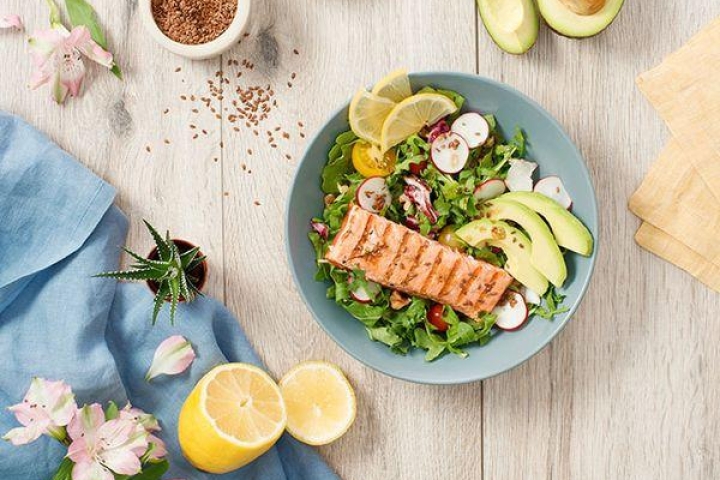Be Fat Fluent: Best Fatty Foods for Your Diet
When aiming to maintain a healthy diet daily, you likely consider your fat intake. You've probably heard the advice to prioritize 'good' fats over 'bad' fats. But what exactly does that mean, and why is it significant? What constitutes healthy fats?
While many people attempt to eliminate saturated fats and include unsaturated fats in their diets, it's not quite that straightforward. Consuming certain saturated fats can be beneficial, depending on the source. Commonly consumed healthy fats, such as monounsaturated fats, polyunsaturated fats, omega-3 fatty acids, and omega-6 fatty acids, are primarily found in plants and fish. This article will delve into the various types of fats, what you need to know about them, and provide a list of the best fatty foods for your diet.
What's the Difference Between Saturated & Unsaturated Fats?
The most apparent visible difference is that saturated fats are solid at room temperature, whereas unsaturated fats remain liquid. Scientifically, unsaturated fats have fewer hydrogen atoms bonded to their carbon chains.1 Saturated fats, on the other hand, contain the maximum number of hydrogen atoms that can bind to the carbon chain, hence the term saturated. This level of hydrogen saturation influences how the body processes the fat.
What are the Types of 'Good' Unsaturated Fats?
Unsaturated fats are categorized into two types: monounsaturated fats and polyunsaturated fats, both of which are considered healthy.
Monounsaturated Fats
Staples in the Mediterranean diet, monounsaturated fats, are extensively studied for their potential heart health benefits. Sources include olive oil, avocados, safflower oil, sunflower oil, peanut oil, canola oil, and most nuts.
Polyunsaturated Fats
Have you learned about the health benefits of essential fatty acids like omega-3 and omega-6? These are prominent types of polyunsaturated fats. They support overall health, from heart to brain functionality.
Sources of polyunsaturated fats include fatty fish such as salmon and mackerel, as well as safflower oil, corn oil, sunflower oil, canola oil, walnuts, and flaxseeds.
You can also obtain your essential fatty acids from supplements, like our award-winning Plant Based Omega-3 supplement, which was named 2018 Omega-3 Product of the Year by NutraIngredients USA.
Are Saturated Fats 'Bad' for You?
It depends. Many healthy foods, such as avocados and olive oil, contain small amounts of saturated fat. These are considered healthy saturated fats. However, most dietary saturated fat comes from dairy products, bacon, and red meats. Recent studies on the risks associated with saturated fats are inconclusive1, and while some benefits exist, experts recommend consuming them in moderation. The American Heart Association advises limiting saturated fats to 5-6 percent of total calories.2
The goal is not to completely avoid saturated fats but to limit intake to recommended levels and steer clear of unhealthy, processed foods high in these fats.
Which Fat is the ‘Bad’ Fat?
The fat that should be avoided is trans fat, which can be deceptive in its sources. Trans fat is produced by hydrogenating oils that would otherwise be healthy. You'll find it listed on food labels as "partially hydrogenated" oils. Trans fats have been linked to numerous detrimental health effects and offer no known benefits. It's best to avoid trans fats entirely for better health.
Facts about Fat & Health Benefits of 'Good' Fat
Contrary to popular belief, the amount of fat you consume does not directly correlate with body fat. Consider these facts:
- Fat contains more calories per gram (9) than protein or carbohydrates, but it is also more satiating.
- Fat protects your organs, particularly your brain.
- The only 'bad' fat is trans fat, which can lead to health problems.
As long as you consume fewer calories overall, incorporating fats in your diet shouldn't affect your weight.
The Best Fatty Foods for Your Diet
While some fats are beneficial, this doesn't mean you can eat them in unlimited quantities. Fatty foods are higher in calories than other foods, so monitoring your caloric intake from fats is essential to prevent weight gain and associated health issues.
Looking for a Healthy Fats List?
Here are our recommendations for the best fatty foods to incorporate into your diet:
Avocados & Avocado Oil
Avocados and avocado oil are excellent sources of monounsaturated fats. They also enhance the absorption of specific carotenoids, which promote heart and eye health. Additionally, avocados provide natural soluble fiber, vitamin E, folate, and potassium.
Avocado Nutrient Profile Per Serving (1 oz)
- Calories: 45
- Total Fat: 4.16 g
- Saturated Fat: 0.6 g
- Polyunsaturated Fat: 0.5 g
- Monounsaturated Fat: 2.8 g
- Fiber: 1.9 g
Avocado Oil Nutrient Profile Per Serving (2 tbsp)
- Calories: 248
- Total Fat: 28 g
- Saturated Fat: 3.2 g
- Polyunsaturated Fat: 3.8 g
- Monounsaturated Fat: 19.75 g
- Fiber: 0 g
Peanuts & Peanut Butter
Peanuts and many nut butters contain healthy monounsaturated fats, along with beta-sitosterol, a plant chemical that helps maintain healthy cholesterol levels. Regular nut consumers tend to have a lower body mass index.3 However, monitor your calorie intake when consuming peanuts as they are not low-calorie foods.
Peanuts Nutrient Profile Per Serving (1 oz)
- Calories: 161
- Total Fat: 14 g
- Saturated Fat: 1.78 g
- Polyunsaturated Fat: 4.4 g
- Monounsaturated Fat: 6.9 g
- Fiber: 2.4 g
Peanut Butter Nutrient Profile Per Serving (2 tbsp)
- Calories: 188
- Total Fat: 15.9 g
- Saturated Fat: 3 g
- Polyunsaturated Fat: 3.6 g
- Monounsaturated Fat: 6.6 g
- Fiber: 1.8 g
Olives and Olive Oil
Olives and olive oils are abundant sources of healthy monounsaturated fats. They also contain phytochemicals like polyphenols, which have several health benefits, including promoting a healthy cardiovascular system.4
Olive Nutrient Profile Per Serving (5 olives, 13.5 g)
- Calories: 20
- Total Fat: 2.07 g
- Saturated Fat: 0.27 g
- Polyunsaturated Fat: 0.2 g
- Monounsaturated Fat: 1.53 g
- Fiber: 0.4 g
Olive Oil Nutrient Profile Per Serving (2 tbsp)
- Calories: 239
- Total Fat: 27g
- Saturated Fat: 3.7 g
- Polyunsaturated Fat: 2.8 g
- Monounsaturated Fat: 19.7 g
- Fiber: 0 g
Walnuts
Among nuts, walnuts stand out for their high levels of omega-3 fatty acids. They are one of the few plant sources of these essential fats, which support various aspects of health, including the heart, joints, and brain.5 A small handful of walnuts provides 2.6 grams of omega-3 fatty acids.
Walnut Nutrient Profile Per Serving (1/4 cup)
- Calories: 191
- Total Fat: 19.07 g
- Saturated Fat: 1.8 g
- Polyunsaturated Fat: 13.8 g
- Monounsaturated Fat: 2.6 g
- Fiber: 2 g
Edamame Soybeans
A favorite in places like Japan and Hawaii, edamame, an immature soybean, is high in protein and a natural source of polyunsaturated fat. This type of fat, prevalent in plant-based foods, supports healthy cholesterol levels and promotes a healthy cardiovascular system.
Edamame Nutrient Profile Per Serving (1 cup)
- Calories: 188
- Total Fat: 8 g
- Saturated Fat: 1 g
- Polyunsaturated Fat: 3.3 g
- Monounsaturated Fat: 2 g
- Fiber: 8.1 g
Sunflower Seeds
A popular snack at ballparks, sunflower seeds are a nutritious and convenient choice. A handful of sunflower seeds provides linoleic acid, another essential fatty acid. They are also a natural source of vitamin E, a fat-soluble antioxidant that supports various health aspects, including cell membranes, brain, and heart health.
Sunflower Seeds Nutrient Profile Per Serving (1/4 cup)
- Calories: 204
- Total Fat: 18 g
- Saturated Fat: 1.5 g
- Polyunsaturated Fat: 8.1 g
- Monounsaturated Fat: 6.5 g
- Fiber: 3 g
Flaxseed
Renowned for their omega-3 content, flaxseeds are another natural source of healthy fats. With a nutty flavor, they make an excellent addition to baked goods, yogurts, cereals, and smoothies.
Flaxseed Nutrient Profile Per Serving (2 tbsp)
- Calories: 100
- Total Fat: 8.7 g
- Saturated Fat: .76 g
- Polyunsaturated Fat: 5.9 g
- Monounsaturated Fat: 1.6 g
- Fiber: 5.6 g
Salmon
Considered a prime example of healthy fats, wild-caught salmon is an excellent source of omega-3 fatty acids. It’s also a robust protein source, suitable as a main course or as an addition to a salad. Salmon provides essential nutrients like phosphorus, potassium, and selenium.
Salmon Nutrient Profile Per Serving (3 oz)
- Calories: 155
- Total Fat: 7 g
- Saturated Fat: 1.06 g
- Polyunsaturated Fat: 2.8 g
- Monounsaturated Fat: 2.3 g
- Protein: 21.6 g
Almonds
Almonds are prized not only for their delicate flavor and versatility but also for their ability to support cardiovascular health. They are a natural source of monounsaturated fats (the same fats that have made olive oil famous) and provide vitamin E.
Almonds Nutrient Profile Per Serving (1/4 cup)
- Calories: 207
- Total Fat: 17.85 g
- Saturated Fat: 1.4 g
- Polyunsaturated Fat: 4.4 g
- Monounsaturated Fat: 11.2 g
- Fiber: 4.5 g
Pumpkin Seeds
Pumpkin seeds, enjoyable whether freshly roasted or pre-packaged, are full of healthy fats. They also contain B vitamins, magnesium, zinc, and the amino acid L-tryptophan, known for promoting sleep.
Pumpkin Seeds Nutrient Profile Per Serving (1 oz)
- Calories: 126
- Total Fat: 5.5 g
- Saturated Fat: 1.04 g
- Polyunsaturated Fat: 2.5 g
- Monounsaturated Fat: 1.7 g
- Fiber: 5.2 g
If you enjoyed this list of foods containing healthy fats, you might also like reading Top 10 Worst Processed Foods and Top Foods that Promote Eye Health.
Looking for more A-Z Wellness tips? See Decide Your Diet: How to Decide Your Daily Diet or you can find all our BubbForest Health A-Z Guide to Modern Wellness articles here.
About Amy Sunderman, MS, RD
Director of Science & Innovation, Registered Dietitian, BubbForest Health
Amy is a registered dietitian, nutritionist, and author with over 17 years of experience in the supplement industry. Amy is passionate about dietary supplements and the health benefits they offer. She enjoys working to find novel nutritional ingredients with strong clinical research behind them to drive innovation and provide health-promoting products to consumers.
Sources
1 The Truth About Fats: The Good, the Bad, and the In-Between: Harvard Health Publishing. https://www.health.harvard.edu/staying-healthy/the-truth-about-fats-bad-and-good (Accessed 12/14/2017)
2 The American Heart Association's Diet and Lifestyle Recommendations: American Heart Association.



Leave a comment